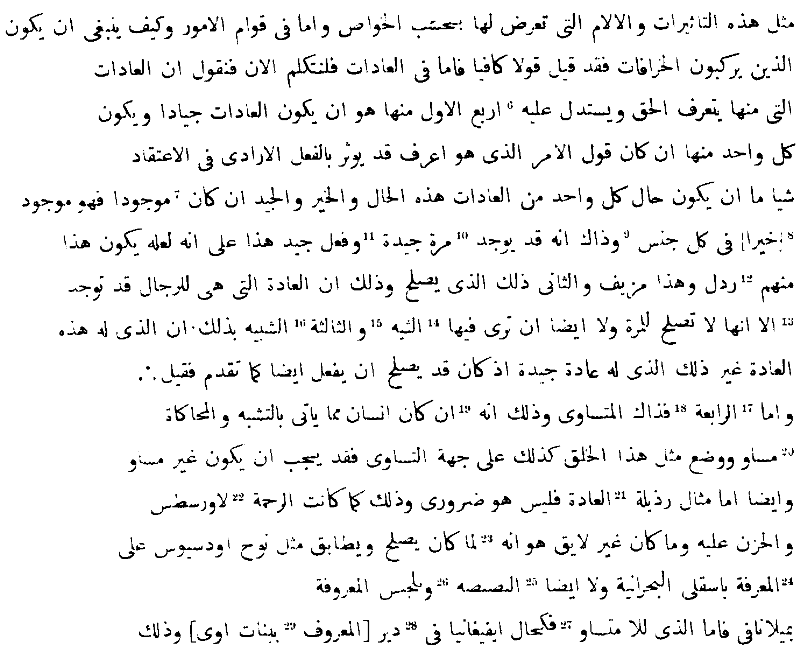Аристотель «Поэтика»: Характеры (1454a16)
Перевод М. Гаспарова
[а16] Что касается характеров, то здесь следует иметь в виду четыре цели. <1> Первое и главное: характеры должны быть хорошими (χρηστοί). [а17] <Лицо> будет иметь характер, если, как сказано, обнаружит в своих речах или поступках
[а28] <1> Пример низости характера, не вызванной необходимостью, — Менелай в «Оресте»; <2> <пример характера> непристойного и несообразного — плач Одиссея в «Скилле» и речь Меланиппы; <4> <пример> непоследовательного — «Ифигения в Авлиде», так как умоляющая Ифигения совсем не похожа на ту, какой она является вслед за тем.
Перевод В. Аппельрота
Перевод Н. Новосадского
Второе условие — соответствие (характеров действующим лицам). Так, характер Аталанты мужественный, но женщине не подобает быть мужественной или страшной.
Третье условие — правдоподобие. Это особая задача, — не то, чтобы создать благородный или соответствующий данному лицу характер, как сказано.
Четвертое условие — последовательность. Даже если изображаемое лицо совершенно непоследовательно и в основе его поступков лежит такой характер, то
Примером низости характера, не вызванной необходимостью, является Менелай в «Оресте». Пример поступка, несоответственного и несогласного с характером, — плач Одиссея в «Скилле» и речь Меланиппы… Пример непоследовательности — Ифигения в Авлиде, так как умоляющая она совершенно не похожа на ту, которая выступает (в той же трагедии) позже.
Translated by W.H. Fyfe
The second point is that the characters should be appropriate. A character may be manly, but it is not appropriate for a woman to be manly or clever.
Thirdly, it should be «like». This is different from making the character good and from making it appropriate in the sense of the word as used above.
Fourthly, it should be consistent. Even if the original be inconsistent and offers such a character to the poet for representation, still he must be consistently inconsistent.
An example of unnecessary badness of character is Menelaos in the Orestes; of character that is unfitting and inappropriate the lament of Odysseus in the Scylla and Melanippe’s speech; of inconsistent character Iphigeneia in Aulis, for the suppliant Iphigeneia is not at all like her later character.
Translated by S.H. Butcher
Translated by I. Bywater
Traduction Ch. Emile Ruelle
II. Le personnage aura des moeurs si, comme on l’a dit, la parole ou l’action fait révéler un dessein; de bonnes moeurs, si le dessein révélé est bon.
III. Chaque classe de personnes a son genre da bonté il y a celle de la femme, celle de l’esclave, bien que le caractère moral de l’une soit
IV. Le second point, c’est que (les moeurs) soient en rapport de convenance (avec le personnage). Ainsi la bravoure est un trait de caractère, mais il ne convient pas à un rôle de femme d’être brave ou terrible.
V. Le troisième point, c’est la ressemblance. Car c’est autre chose que de représenter un caractère honnête et (un caractère) en rapport de convenance (avec le personnage), comme on l’a dit.
VI. Le quatrième, c’est l’égalité. Et en effet, le personnage qui présente une imitation et qui suppose un tel caractère, lors même qu’il serait inégal, devra être également inégal.
VII Un exemple de perversité morale non nécessaire c’est le Ménélas d’Oreste; de caractère dépourvu de décence et convenance, la lamentation d’Ulysse, dans Scylla, et le discours de Mélanippe; de rôle inégal, Iphigénie à Aulis; car, dans les scènes où elle est suppliante, elle ne ressemble en rien à ce qu’elle se montre plus tard.
